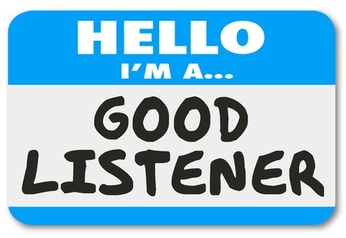|
I had a friend over for dinner the other week. I just finished giving her updates on my life, how my recent trip back East went, what was hard, what was new. After I finished, I was met with a “that’s good” type of response. Not much more. It was like talking into a well, with no feedback, affirmation, insights, commiserating … nothing. Then, she launched into her updates, and I spent the remainder of the evening listening, supporting, ad-hoc coaching, and offering feedback to her on her relationships and challenges.
Reflecting on the evening, I felt a little sad and, truth be told, a little used. Why is it so hard for someone to listen thoughtfully and to let me know I’ve been heard? I listened to her; why can’t she show me that she’s actively listening to me? All of this got me thinking about what makes someone a good listener. Let’s start with recognizing what it is to not listen well. You are quick to interrupt. You are quick to hear someone and you generally interrupt them to offer a thought or response before they can finish what it is they are saying. This shows you are not holding space to sufficiently take in what you hear. Rather, you are already trying to craft an answer, rebuttal, opinion, or respond before fully listening. Note: if you are a coach, you may be taught to intrude for the purpose of keeping your client on track, but for the rest of you, you probably aren’t listening well if you continually interrupt. You overshare. You take up 80% of the space in your conversations. You are concerned with expressing yourself and making sure you get heard but leave little room for others. You tend to multitask while someone is talking. Unless you are knitting, walking, or doing something that takes unconscious competence to do, chances are you are not fully listening to the other person when you are doing something else at the same time. It is impossible to be a good listener if you are typing an e-mail or reading the news on your phone. The brain does not multitask; it can only do one thing at a time. Although you may think you are successfully doing many things at once, in actuality your brain is switching back and forth from task to task and your attention is being divided. You self-reference. You automatically apply what someone is saying to your own situation. In other words, you don’t take the time to show you are understanding what they are saying and feeling. Instead, you bring the conversation back to you and how you would feel if you were in their position. This is different from empathizing with someone, as you are not genuinely trying to understand the other person’s feelings as much as you are projecting your thoughts and feelings onto their situation. See any of these behaviors in yourself? If so, you may have a great opportunity to grow your leadership skills by becoming a better listener. In coaching, one of the first things we do is learn the 3 levels of listening. Level 1 listening is all about self-referencing per the example above. For example, if your friend says something, you immediately think of yourself and say, “Oh yeah, I remember when that happened to me." In other words, it’s all about referencing what someone is saying in relation to you and your experience. It’s not a bad level, per se. It is the level we probably most often encounter in our relationships. But it is not the most powerful level of listening. Level 2 is when you can actually start to listen to someone and stop referring back to yourself. You really hear what it is they are trying to say. You are focused on them and not on yourself. And level 3 is about listening to all the things that are NOT being said, but that are present in a conversation - the energy of the person, their intonation, what you are hearing between the words, what your intuition tells you. This is where you as a leader really have the power to achieve deeper understanding and, ultimately, effect better outcomes through listening. Here are some tips for achieving level 3 listening: 1. So what I’m hearing you say is … This is a great phrase that sets you up for an attempt to understand and reiterate what it is you heard the other person say. If you are listening well, you should be able to sum up what it is you think the person is trying to say. You can also use other versions of this phrase, such as: It seems like … I hear you. It sounds like … Using any of these phrases will not only help you synthesize what you just heard, but will indicate to the other person that you are truly trying to understand what they are saying.. 2. That’s curious. How did that make you feel? … Being curious about what the other person says will help you listen better. Asking them how something made them feel can help them reflect more on what it is they are saying and also give you another angle to understand what it is they are trying to say. 3. Simply ask those around you whether they think you are an effective listener. If it’s a “no,” or you get a wishy-washy response because they are afraid to tell you the truth, ask, “How could I improve?” You’ll be surprised at what they say. Maybe they will tell you not to interrupt so much when you didn’t realize you were doing that. Maybe they need a nod or more eye contact from you. Maybe they just need an acknowledgement of some sort. If you don’t ask, you won’t know! Challenge yourself in your next conversation: go in with the intention of listening and making the other person feel heard. Challenge yourself to not respond, offer advice, or self-relate until the person is finished speaking. See how long you can go just listening! As you practice better listening, you’ll likely gain new insights about yourself and about the person you are listening to. Getting curious while listening can prompt you to ask the right questions for solving problems and demonstrates that you are truly present in the interaction. Most of all, growing your listening is growing your leadership. Try these listening tips and leave a comment below about the differences you notice in your conversations! Like what you read? Sign up for my monthly e-news!
4 Comments
11/1/2022 04:50:16 pm
Great tip about synthesizing what you heard. I want to be a more effective leader. I'll have to hire a leadership consultant.
Reply
Leave a Reply. |
AuthorFarhana Huq Archives
June 2023
Categories
All
|
Copyright 2014-2024 Surf Life Executive Coaching



 RSS Feed
RSS Feed